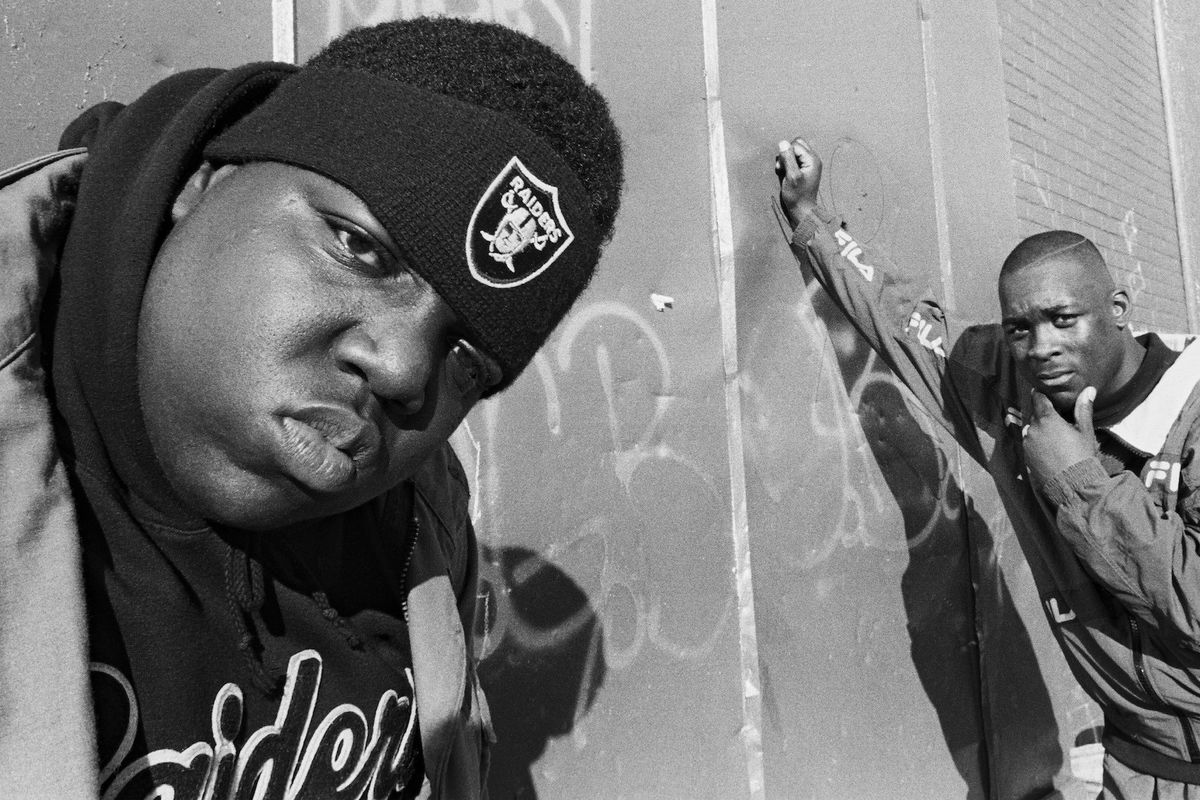
Biggie with friend wearing hat Biggie: I Got a Story to Tell
Photo Credit: George DuBose
To continue reading
Create a free account or sign in to unlock more free articles.
By continuing, you agree to the Terms of Service and acknowledge our Privacy Policy
Register
The content is free, but you must be subscribed to Okayplayer to continue reading.
THANK YOU FOR SUBSCRIBING
Join our newsletter family to stay tapped into the latest in Hip Hop culture!
Login
To continue reading login to your account.
Forgot your password?
Please enter the email address you use for your account so we can send you a link to reset your password:

There are two ways to make a good music documentary. A director can create something wide, an expansive, sprawling piece of work that covers generations of material, like Wu-Tang's brilliant four-part documentaryOf Mics and Men or Allen Hughes's ode to Dr. Dre,The Defiant Ones. Or a filmmaker can go deep, do something smaller — an inmate snapshot of a particular period of time, using that moment as a vessel to make a bigger point. Movies like Fade to Black — about JAY-Z's 2003 Madison Square Garden concert — orTime is Illmatic, a documentary that breaks down the making of Nas' iconic debut, come to mind.
OnBiggie: I Got a Story to Tell, Netflix's new documentary about one of the most brilliant rap figures of all time,The Notorious B.I.G., filmmakers attempt to go deep. Directed by Emmett Malloy — one half of the music video-directing team The Malloys — the documentary, which you can stream on Netflix on March 1st, is a perfectly adequate "origin story," looking at the years before Biggie releasedReady to Die, his 1994 breakout masterpiece.
Biggie Smalls grew up Christopher Wallace, a good Brooklyn kid who was the son of a strict teacher, Viola Wallace, who didn't let him leave the stoop. As Christopher got older, he would head up the block — to Fulton St. — and became seduced by the street life. Biggie's life story isn’t new material. And if you listened to Ready to Die or Life After Death or watched the 2009 feature film Notorious you know the stories well — how he hid drugs from his mother, did dirt with his deceased friend O, and took trips out of town to sell drugs.
This movie documents all of those stories, using the fact that they got full involvement fromThe Notorious B.I.G.'s family and friends — the movie's main selling point — to its advantage. (Diddy and Voletta are both executive producers.) This means that not only most of the immediate family spoke with the director but there is a bunch of amazing, never-seen-before footage, supplied by Biggie's best friend Damion "D-Roc" Butler. With the footage, you get to see what a charismatic goofball he was, a far contrast to the Frank White persona he liked to put on. (One of the more striking moments is Biggie hilariously singing Jodeci’s “Freek’n You,”)
And because of the family involvement, they are the voices who push the narrative forward the most. Whether it's Viola Wallace talking about her ambivalence toward her son's rap career — she revealed she only listened to his albums once — or friends and collaborators like Roc, Lil' Cease, and Easy Mo B breaking down the complexities of Bedford–Stuyvesant's drug trade.
The family voices help provide a guide and highlight little details that are not well known, like his trips to Jamaica as a child and his relationship with jazz saxophonist Donald Harrison, who lived on Biggie's block. These details, with D. Roc's footage, is when the movie shines the brightest. And there is a sweet 30-minute stretch where this movie is really humming.
However, the family's involvement becomes its biggest weakness. Biggie: I Got a Story to Tell just doesn't go deep enough. This is ultimately a very romantic look at the rapper's pre-fame years. (Stuff like the Tupac conflict and the making of Life After Death get yadda yadda'd here). This is crystallized by Diddy's appearance. The mogul is probably the most important figure in Biggie's creative life. But he is almost useless here, too hamfisted and self valorizing to be truly introspective or interesting. And, with the exception of Voletta and brief appearances from Biggie's grandmother and ex-wife Faith Evans, we don’t really hear from the women in his life. Lil Kim, Biggie's most famous protege, is not in this move. It's a shocking omission until you remember Lil Kim recently revealed that Biggie once held a gun to her head.
But, even with its flaws, there are worse ways to spend 98 minutes. And a figure like Biggie deserves to have his origin story told. Even if we heard it already.